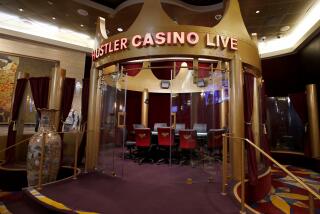Players Gambles its Stakes on Middle Rollers
- Share via
A Canoga Park firm that is betting on gamblers for profits has had financial statements showing mostly the dreaded snake eyes so far. But there are signs that the company, Players International, may be starting to get lucky.
Players’ main business is selling memberships to gamblers for $100 each that are good for discounts on food, lodging and entertainment in Nevada, Atlantic City, N.J., and the Bahamas.
Last week, Players announced a restructuring that includes an infusion of new capital. It also said that memberships are up sharply, to about 26,000, and that revenue for its first fiscal quarter ended June 30 was higher than for the entire preceding year.
“They’ve latched onto a niche--the middle-roller market,” said Paul Dworin, editor of Gaming & Wagering Business, a trade journal.
He said big spenders who drop $100,000 a year in casinos get free rooms and food, and some casinos are forming slot-machine clubs to cater to that lucrative market. But, he said, Players International was the first to go after the middle-market gambler.
Since Players’ programs help fill rooms, he said, several prominent hotel-casinos are participating. Indeed, Players has managed to sign 12 U. S. casinos plus five in the Bahamas and five casino cruise ships. Participants include the Riviera and the Sahara in Las Vegas and Resorts and Harrah’s Marina in Atlantic City, according to Players.
At its shareholder meeting Friday in Sherman Oaks, the company shortened its name from Players Club International and said it would reorganize into four divisions to exploit its other business lines. The operations include a travel service booking gambling trips, a unit that runs gambling tournaments and a division that sells computer terminals so gamblers can get cash advances using credit cards.
Players was formed in late 1984 by Edward Fishman, 44, and David Fishman, 39. The brothers used to produce daytime game shows and then started running gambling tournaments. In April, 1985, the firm merged with a Utah shell company to go public.
The company has six major shareholders who control 60% of its stock. The Fishmans, along with company President Stanley Harfenist, 54, are the biggest shareholders. David Fishman is vice chairman and Edward Fishman is chairman.
Players announced last week that it completed a $1.4-million private placement of nearly 1.4 million units. The units each consist of four shares of common stock and one warrant to buy another share of common stock for 10 cents between Feb. 28, 1987, and May 31, 1991. The company said the shares were sold relatively cheaply because they can’t be resold for two years.
Players also sold Oppenheimer & Co., which handled the private placement, 1.5 million warrants at 8 cents each, for a total of $120,000. Each warrant enables the holder to buy one share of Players International common for 10 cents between the same dates.
Players said the added capital enabled it to pay off its $500,000 debt and increase working capital. Harvey Goldberg, chief financial officer, said that, before the fund raising, the company had a negative net worth and a working capital deficit.
As part of its deal, Oppenheimer named Jerome H. Turk, manager of its direct-investment department, to the Players board. Turk, 43, is a lawyer and certified public accountant. Howard A. Goldberg, a 41-year-old lawyer and casino specialist from New Jersey, also joined the board, bringing the number of directors to five.
Shareholders approved a 1-for-5 reverse stock split for early September that will reduce outstanding shares to 6.9 million from 34.7 million. Players stock has traded recently at a price of about 62 1/2 cents.
So far, Players has not been profitable. David Fishman said the company lost $156,000 for its first fiscal quarter ended June 30 on revenue of $766,000. Comparable year-ago results weren’t available. The company’s shares are in so few hands that it doesn’t have to file reports with the Securities and Exchange Commission.
For its first fiscal year, which ended March 31, Players lost $631,000 on revenue of $644,000.
But Fishman said the company’s sales are higher than they seem. He explained that revenue from new memberships is booked over the course of a year because refunds are always theoretically possible.
Counting all memberships sold, he said, Players actually had sales of $1.5 million in the first quarter, and $1.1 million for the year ended March 31.
Fishman said memberships are increasing fast--by 3,500 to 4,500 a month.
More to Read
Inside the business of entertainment
The Wide Shot brings you news, analysis and insights on everything from streaming wars to production — and what it all means for the future.
You may occasionally receive promotional content from the Los Angeles Times.










